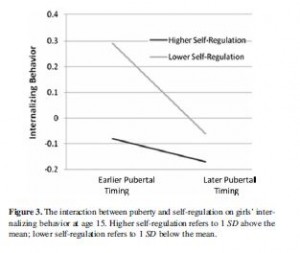The onset of puberty has been occurring earlier for unclear reasons. Furthermore, a relatively early puberty onset has been associated with internalizing symptoms such as anxiety and depression, especially for girls. A new study from the journal Development and Psychopathology tests the idea that the effect of this phenomenon may depend on individual attributes such as one’s temperament.
Subjects included 1,025 individuals from the age 11 to 15 who were followed longitudinally for the National Institute of Child Health and Human Development Study of Early Child Care and Youth Development (NICHD SECCYD). Temperament was measured using items from various scales, internalizing problems was assessed with the Child Behavior Checklist, while puberty timing was assessed by physical exam. The study focused on temperament dimensions related to emotional reactivity and self-regulation. Structural equation modeling was used to predict age 15 internalizing scores from temperament, puberty timing and their interaction.
Results showed that, for girls, early onset of puberty, higher emotional reactivity, and lower self-regulation predicted internalizing symptoms at age 15. The relation between puberty timing and internalizing problems was found be a function of temperament with the effect of early puberty strongest among subjects with lower self-regulation. Controlling for baseline internalizing scores, however, resulted in nonsignificant associations between internalizing problems and both puberty timing and emotional reactivity. For boys, emotional reactivity and low self-regulation was again found to predict internalizing symptoms but no effect of puberty timing was found.
The authors concluded that, for girls only, early puberty is associated with increased internalizing problems, especially for those with specific temperamental vulnerabilities. This link appears to be due to the association of puberty timing with internalizing problems at age 11 rather than later in adolescence (since controlling for age 11 internalizing problems eliminated the effect of early puberty).
While the headline of the study was related to the effect of puberty, what stands out for both boys and girls was the association between later psychopathology and temperament. Like many studies that examine the relations between temperament and psychiatric symptoms, however, it is important to remember that the items used to measure both constructs are often quite similar.
With apologies for the shameless plug, I invite those interested in learning more about the connection between temperament and psychiatric symptoms to check out my new book on the subject to be released next month.
Reference
Crockett LJ, et al. The role of pubertal timing and temperametal vulnerability in adolescents’ internalizing problems. Development and Psychopathology 2013; 25(2):377-389.

